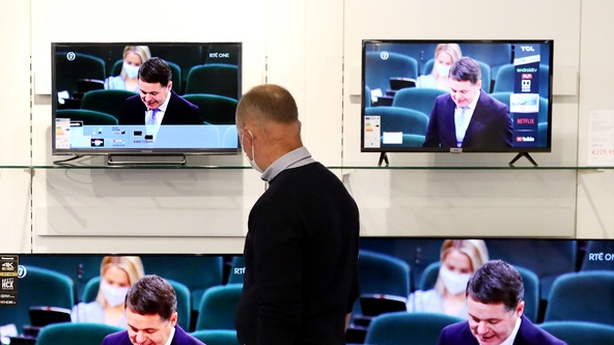A record Budget package of €17.75bn in extra spending has been announced, with nearly half of all expenditure going on Covid-19 supports.
Minister for Finance Paschal Donohoe said this was a Budget to tackle the invisible enemy of Covid-19, while Minister for Public Expenditure Michael McGrath said the essential task was to give hope.
Delivering Budget 2021 from the Convention Centre Dublin, Mr Donohoe said that the country had faced numerous difficulties since independence, but never one like Covid-19.
He said the pandemic was an invisible enemy that had caused great suffering and disrupted so much of what is central to our well-being.
"We live in an era of great uncertainty and increasing risk," the minister said. "Overcoming these challenges in the interests of our fellow citizens is the central task of this Government."
We need your consent to load this rte-player contentWe use rte-player to manage extra content that can set cookies on your device and collect data about your activity. Please review their details and accept them to load the content.Manage Preferences
There are no major income tax changes in Budget 2021.
Minister McGrath said an extra €4bn is being made available for the health service in Budget 2021.
On social welfare, there is extra child benefit and rises for the living alone and fuel allowances.
The Christmas bonus will be paid for all social welfare and most PUP recipients.
For drivers, the carbon tax rise means fuel will go up from midnight tonight, while there will be tax breaks for green vehicles and higher VRT rates for polluting cars.
Cigarettes will go up 50 cent but there is no extra tax on alcohol.
The VAT rate for the hospitality and tourism sector will be cut from 13.5% to 9% with effect from 1 November, while the wage subsidy scheme will be extended.
The Government has begun the process to apply for EU funding towards the costs of the Temporary Wage Subsidy Scheme, which could result in Ireland accessing just under €2.5bn.

Minister McGrath said the combined threats posed by Covid-19 and Brexit left the country facing a "truly remarkable" challenge.
"The task for this Government is to guide the country through one of the most difficult periods in our history," he said.
Businesses severely hit by restrictions can get a weekly payment of up to €5,000.
There has been €3.4bn set aside for a recovery fund, while €1.6bn has been allocated for capital spending.
Mr Donohoe said the total value of Covid-19 support measures so far amounts to €24.25bn.
He noted that when he presented Budget 2020 last year, we were confronting the main challenge then facing our country - a hard Brexit.
"This year, while we continue to prepare for Brexit, we are now responding to the worst global pandemic in a century," he added.
We need your consent to load this rte-player contentWe use rte-player to manage extra content that can set cookies on your device and collect data about your activity. Please review their details and accept them to load the content.Manage Preferences
The minister said today's Budget must advance efforts to make progress on the great priorities that society here continues to value - more homes, improved healthcare and a better national response to climate change.
He said that Budget 2021 is a bridge to a better future for the country.
The minister said that two major assumptions underpin today's Budget.
Firstly, Budget 2021 is framed on the basis of no bilateral trade deal between the EU and the UK.
Mr Donohoe estimated that the absence of such a deal will reduce Irish growth by just under 3 percentage points in 2021, with expected growth of 1.75%.
Today's Budget has also been framed on the assumption of the continued presence of the coronavirus in Ireland next year, and the absence of a broadly available vaccine.
Read more:
At a glance: What's in Budget 2021
Funding for up to 620 new garda recruits
Govt committed to strategy on remote working
Tax credit for self-employed brought into line with PAYE credit
Looking to the final months of this year, the minister said that GDP is set to decline by 2.5% for the year as a whole, with domestic demand falling by 6%.
He predicted that the unemployment rate is expected to decline slowly throughout the second half of the year, reaching 12.25% in the fourth quarter, with an annual average rate of just under 16%.
But Mr Donohoe cautioned that this figure could change depending on the overall path of the virus.
The Department of Finance has forecast a total loss of approximately 320,000 jobs in 2020, with this recovering by approximately 155,000 jobs next year.
Mr Donohoe said that is clear that the pandemic has had a disproportionate impact on the job prospects of younger workers.
He noted that youth unemployment hit a peak of 64% in May, before falling to 37% in September figures that were unimaginable just a few short months ago.
"This Government is steadfast in its determination to overcome the challenge of unemployment amongst our young," he stated.
The Tánaiste and Minister for Enterprise, Trade and Employment Leo Varadkar has described the Budget as "pro jobs" and "pro business".
Mr Varadkar said it helps business owners and employees through a difficult time.
''It is unprecedented in scale and protects lives and livelihoods,'' Mr Varadkar said. ''It's a Budget of hope that presents the possibility that 2021 is going to better.''
Speaking in the Convention Centre, Pearse Doherty said that the Budget needed to respond to the threats of Covid-19 and Brexit and give certainty to families.
Co-leader of the Social Democrats Róisín Shortall said while the allocation of an additional 66 critical care beds in Budget 2021 is welcome, it is a "very modest start", as she said there is a shortage of about 250 critical care beds.